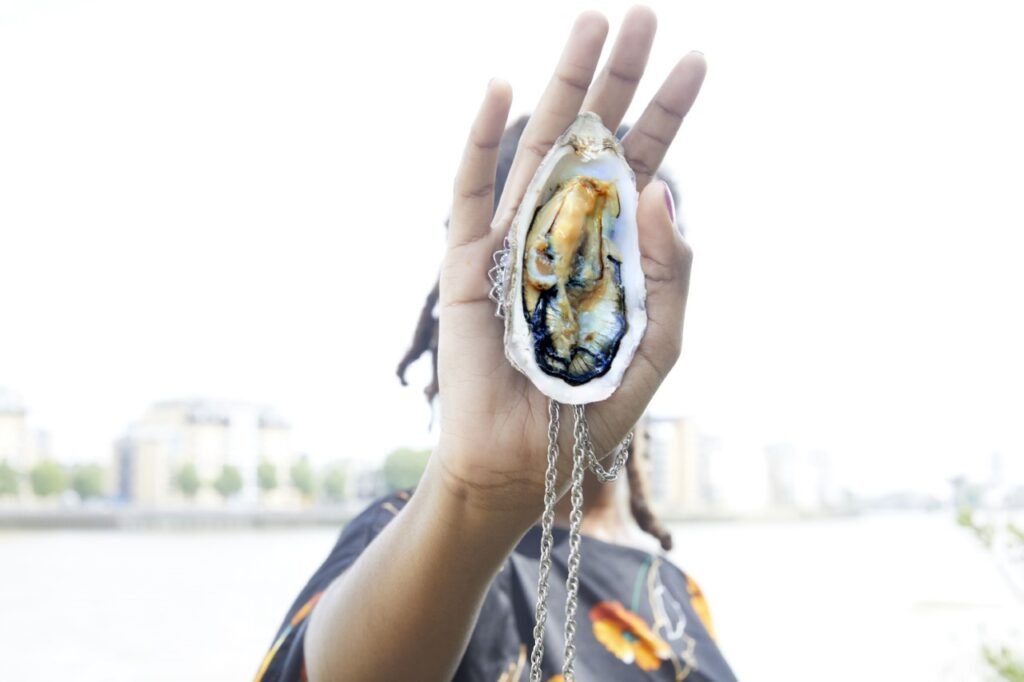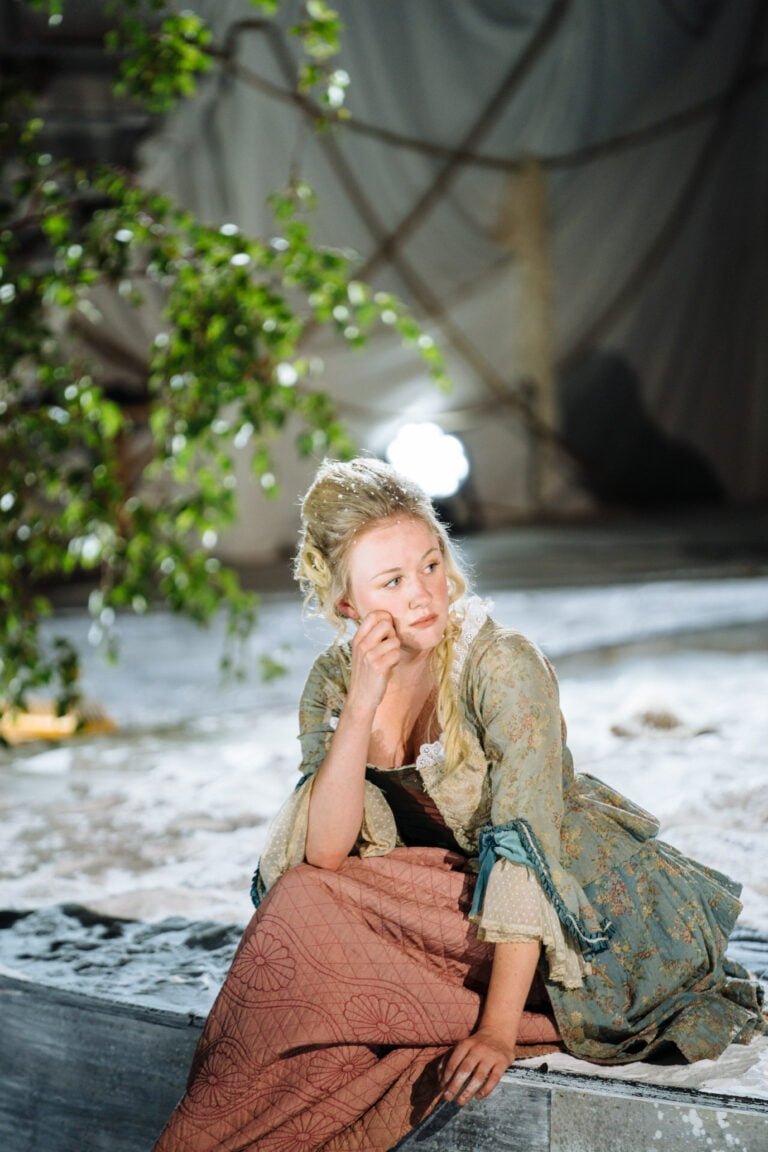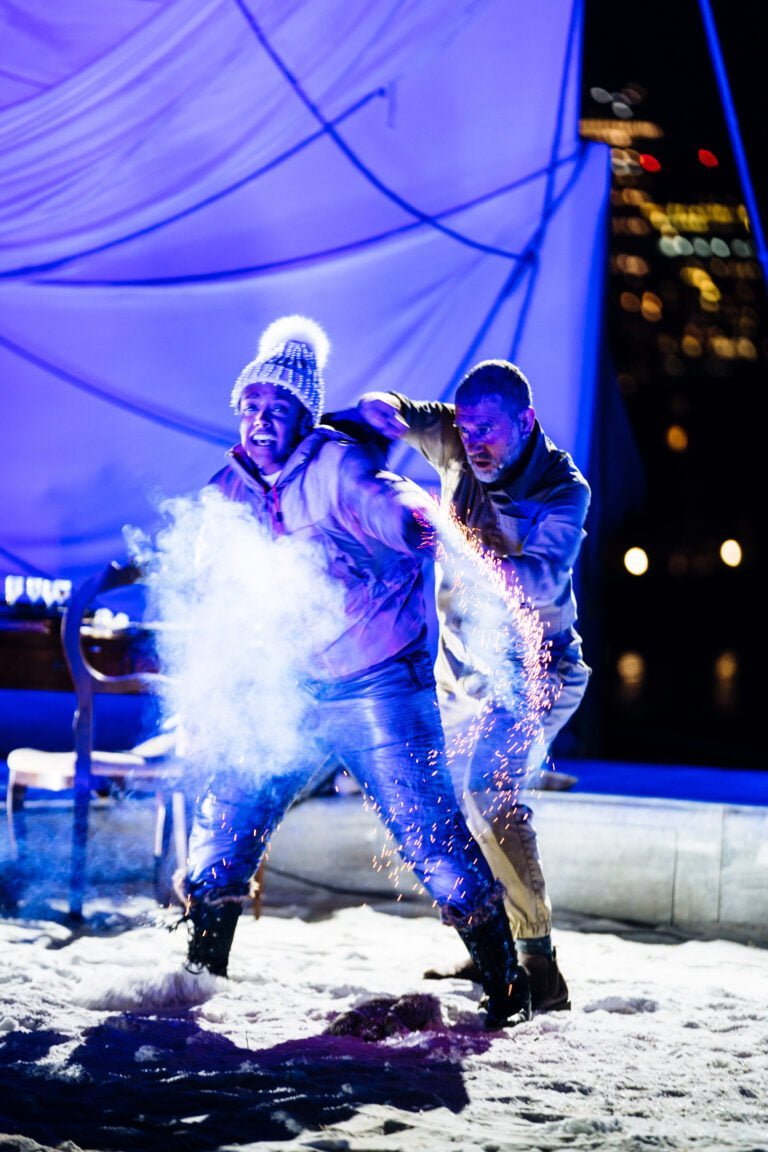Something old, something new, something borrowed, some thing... blue?
“I can barely contain myself…“
A heavily pregnant Gretchen.

The Gretchen Question is a performance piece devised by Fuel Theatre that addresses what is arguably the most important issue of all: How did the human race come to put its Planet Home in such existential peril?
FUEL theatre claims that “Through [three] interwoven stories, The Gretchen Question dissects how we have arrived at the current climate emergency.”
I suggest it does no such thing. But of course that depends on what you mean by ‘dissect’.
The triple decker narrative of The Gretchen Question begins in Regency London where Gretchen herself (Lauren Moakes) is in turn rejected, tolerated, patronised, permitted to assist the work of the Royal Society, and finally married. A Society Expedition has returned from the far North having discovered a mysterious source of immense power, as might happen in a mid-Season Doctor Who Adventure. We are given a lot of background information about this wondrous find – which appears to be a Pearl from a highly sexualised giant oyster, projected onto a screen. While the relevance of the Pearl to our Climate Crisis is not immediately clear. But it is suggested that if mishandled its unleashed power may pose a threat to the Earth itself! What is also becoming clear is that Allegory is not the most suitable tool to investigate a complex historical process with global social, political, economic and biological dimensions. After all, it is Allegory’s nature to simplify.
When Doctor Who her/himself fails to materialise to sort things out, the Royal Society divides into two camps. One is Cautious and Caring while the other seems Hell-Bent on exploiting Oyster Pearl power to the hilt in ruthless corporate style, whatever the risks. As so often happens when people debate the imaginary qualities of a fictional Pearl, they fail to agree. Without the Doctor’s help the most obvious course is to consult a German poet. So Goethe (Katherine Manners) appears. He initially supports the Caring Side, but defects to the Dark Side side for money, like the treacherous foreigner he is. The Regency folk have a world-challenging crisis on their hands. How can it be resolved? By an explosion of violence, of course! And one that lays more bodies on the boards than Hamlet does.
By this point do we have a better understanding of the Current Climate Crisis? Enormous Power Source + Bickering Scientists + The Corporation + Expertise for Sale + Humans are both Creative and Destructive + This all happened a long time ago… All right, but what does it add up to?

Perhaps the two other stories being told in parallel can help us? Both also feature female victim figures. And Gretchen is a victim too… Got it! Go on…
Fast forward some 200 years and Influencer Maisie (Yohanna Ephrem) accepts Corporate sponsorship to post from the North Pole. “She used to be a Pole Dancer and now she’s a North Pole Dancer!” says one of the two Rude Mechanicals who work at the local Ice Rink and comment wittily on the action. Ah? Is Maisie’s a Faustian bargain like the one that dodgy Goethe described? Not really because his Faust wanted knowledge while Maisie just wants more fame and Followers. Her task is to gaslight them on behalf of the Corporation. But when she proves ‘unreliable’ she is disposed of.
On the other hand, Lulit (Tamaira Hesson), may already have been abused and gaslighted by one of the Mechanicals. Her amnesia is offset by other more mysterious ailments, but she is ignored wherever she seeks help. Both women freeze to death: Lulit on the ice rink, Maisie in the Arctic, which still has reassuringly lethal low temperatures. The home of one of the Mechanicals is flooded and his wife takes the kids and leaves.
So do these plot lines really cohere to enrich our understanding of the Current Climate Crisis? Hardly. The stories are not so much interwoven with Gretchen’s as casually propped up against it, providing some spectacle for the play but weakening what little force it had in the first place. It is further weakened by all the action going on behind the leads. This is a very very busy stage. Characters pose, dance, pop up from trap doors, disappear down them, wrestle with brown polar bears (Brown? Or are they Beasts of M. Racine? Reviewers are allowed to be obscure too…)

At one point Gretchen, Maisie and Lulit are transported to the constellation of Lyra where they enjoy a smoke together, as you would after a long trip. Perhaps this is somehow invoking Philip Pullman’s Dark Materials Trilogy or is the suggestion that one day soon we may all be able to live up in the stars along with Richard, Jeff and Elon. Wouldn’t that be nice?
Meanwhile random bursts of static freeze the action and dim the lights. This could symbolise modern media’s assault on our ability to concentrate but it is the Show itself that begins to seem like an exercise in performance-induced attention deficiency. (ALERT! There’s someone trying to think in Row 3. Quick! Hold up a duelling pistol like in Hamilton…)
The production is very skilful. As it must be. The small cast play multiple parts, create effects, project sound and image, displaying split-second coordination with each other and the two musicians.
But their virtuosity cannot hide the basic hollowness of the text. The action unravels in the very extended coda with a sciency person, sounding remarkably like David Attenborough, giving a lengthy, account of the physiology of hypothermia. This describes the fate of a character, but it is also ironic since the audience at this open theatre has been feeling the bite of a Northerly wind for well over an hour. But the cumulative effect of the parody is to make our Green Hero sound like a tedious posh bore. Surely this can’t have been the intention? Can it?
So have we learnt anything from Fuel Theatre’s dissection of our journey to the Current Climate Crisis? I must have blinked and missed it. Surely dissection is a rule-based clinical procedure which aims to achieve clarity. The Gretchen Question achieves something more like theatrical cataract. Its accomplished staging only serves to produce bafflement, boredom and apathy.

Production Notes
The Gretchen Question
Created by Melly Still and Max Barton
Directed by Melly Still
Cast
Starring:
Al Nedjari
Alex Mugnaioni
Christopher Saul
Katherine Manners
Ryan Gerald
Tamaira Hesson
Yohanna Ephrem
Lauren Moakes
Creatives
Director: Melly Still
Designer: EM Parry
Music by Second Body
A joint production from Fuel Theatre, the Albany
Information
Running Time: One hour 30 minutes without an interval
Booking to 2nd October 2021
Theatre:
Shipwright Theatre
Master Shipwright’s House
Watergate Street
Deptford
London SE8 3JF
Tube/Rail : Deptford or New Cross
Telephone: 07747833048
Websites:
https://fueltheatre.com/projects/the-gretchen-question/
Reviewed by Brian Clover
at the Shipwright Theatre
on 23rd September 2022
